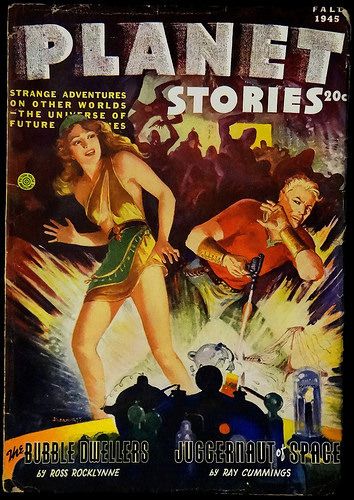Short Reviews – Battlefield in Black by George A. Whittington
Friday , 15, January 2016 Book Review 11 Comments Battlefield in Black by George A. Whittington appeared in the Fall 1945 issue of Planet Stories.
Battlefield in Black by George A. Whittington appeared in the Fall 1945 issue of Planet Stories.
Captain Jon McPartland has problems. His girlfriend Almira is the daughter of Marshal Denton, “Supreme Commander of all Solar System forces”. The peoples of Earth and her solar colonies are governed by a “Congress of Specialists”, which is sort of like a cross between a PhD review board and a Senate. Academics are running everything and the worlds have been disarmed. Only the “Space Patrol” remains to enforce law in the Solar System. Almira is trying to get into Congress as a head shrink by putting together a presentation psychoanalyzing Jon; as the daughter of a military bigshot who’s presenting on a bona fide war hero, why she’s a shoe-in to be welcomed into the ranks of the ruling class! Jon doesn’t want to have his head served up on a platter to a bunch of egg heads who’d probably like to put him out of a job, and the couple has a big fight right on the eve of disaster.
All hell breaks loose when communications at multiple bases go dead and a giant black sphere engulfs a huge chunk of the Solar System. Bad guys have a device that removes “ether” from space. This “ether” is more magic than science; you apparently don’t need it to breathe but it is required for everything from sound to radio waves to light to pass through. And it does make a convenient excuse for additional drama-cheese (even the glow-in-the-dark indicator tape on controls can’t be seen!) The “Terra Council for Freedom”, a mix of pirates and Congressional academics led by Mark Baron, the “notorious and deadly outlaw”, have turned out the lights as part of a ploy to rid the Solar System of its last military forces. It’s a simple scheme: wait for the Space Patrol to take Congress into protective custody and accuse Marshal Denton of being a dictator trying to commit a military coup. It’s up to Jon McPartland to find a needle in haystack, blow up the darkness generator, clear his future father-in-law’s good name and work things out with his pushy social sciences girlfriend.
Battlefield in Black is a story that’s silly in its seriousness. Bad or silly science is easier to handwave once you’ve accepted magical premises; in a “serious” Mil-SF story the science upon which the story hinges can itself become a running joke if presented as preposterously as it is here. This story also suffers a bit from the indistinguishable flat characters (the Captain So and So, Lieutenant That Guy, Ensign The Other One phenomenon) who exist mostly to shout emergency statuses to the one or two characters we’re supposed to care about. That’s not to say Battlefield in Black is bad story; it’s got action, excitement and a cool (if scientifically flawed) premise to try to get around the ‘no such thing as stealth in space’ quandary. It’s not remarkable, but it is another example that busts the “Planet Stories was nothing but space opera” narrative. There seems to be this notion that Planet Stories only published one kind of story and Astounding only published another kind. And of course, these publications are often framed as antithetical to one another, Astounding/Analog being the “serious” publication and Planet Stories being therefore the “unserious” publication. I haven’t dug deeply enough into Astounding/Analog to make a claim about that magazine, but Planet Stories showcased a wide variety of science fiction with fun, excitement, action and adventure being the common thread.
Astounding published its share of space opera. The most famous example might be Doc Smith’s Lensman series.
Ether is the theoretical medium through which electromagnetic radiation passes, the way a sound wave passes through air or a tidal wave passes through water. It was a serious modern physics theory up until about 1850, and an alternative theory didn’t appear until Einstein. From the review, this story seems to treat the classical theory pretty well.
tl;dr- The only magic here is the technology that removes the ether. The science isn’t magic, it just turned out to be an incorrect theory.
-
For those interested in the science: https://en.wikipedia.org/wiki/Michelson%E2%80%93Morley_experiment
So basically, it’s as if the author chose to write hard sci-fi from the perspective of a scientist from 1850.
For instance, the fact that electrons whizzing around nuclei sometimes produce electromagnetic photons would not belong in the story, because Bohr’s model of the atom didn’t exist yet.
-
I don’t want to go too “death of author” on this, but maybe it could be perceived as criticism of technocracy? Not only have a bunch of egg-heads and social scientists stripped the inner solar system of the security that a military presence provides, by ignoring the very real risks posed by a universe actually operating on pre-Einsteinian physics, Earth may be forced to acquiesce to the demands of terrorists!
[…] does a good deal better, I feel, with this Planetary Romance than with his space thriller A Battlefield in Black; with fewer characters, he’s able to bring more life to them without too much taken up by the Lt. […]